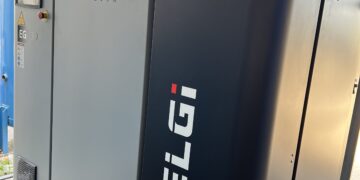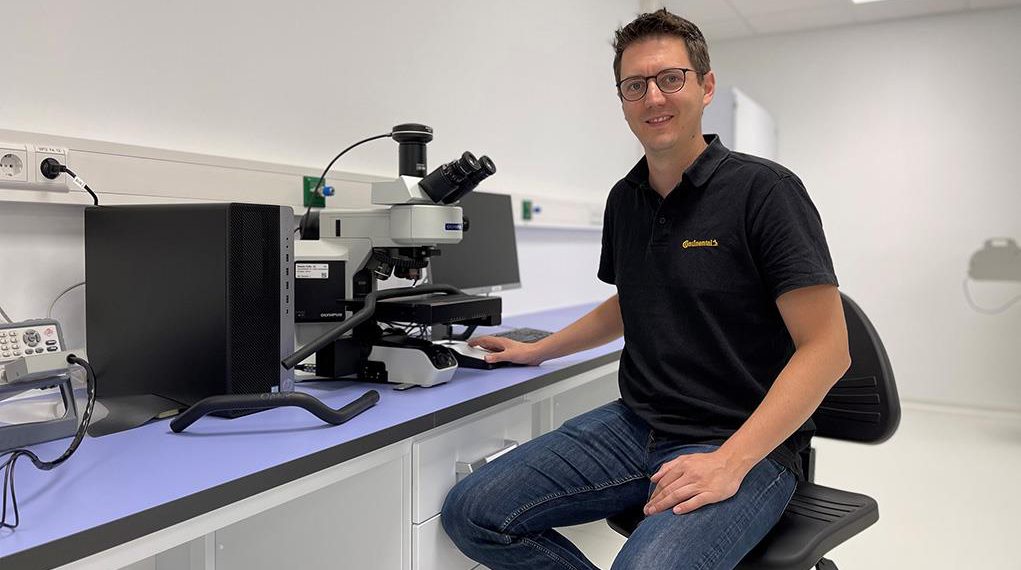A small team of highly qualified experts is taking an important step toward the digital future at Continental’s new location in Freiburg: testing, trying, rethinking. Short paths, lean processes, fast results.
“It feels like being in a start-up. We are very flexible and can quickly develop and adapt our processes; there is a great dynamic here. At the same time, we can build on the strength of the entire Continental Corporation.”
- Tim Wolfer, Project Manager
Here, for example, classic rubber and plastic products, which until now have only fulfilled mechanical tasks, are to be enriched with sensor technology, intelligent systems and actuator technology and thus digitized. Wolfer holds a doctorate in mechanical engineering and has been responsible for research projects at the Drucktechnikum since fall 2020.
“My focus here is on the integration of intelligent systems and networks. In particular, we are looking at the interface of components made of elastomers and the integration of electronics,” says the engineer. A native of Bremen, he previously worked for five years as a group leader at the Production Technology Center of the University of Hanover. There, among other things, he established close contacts with his current employer, Continental.
The 36-year-old family man was already passionate about tinkering and screwing in his childhood and youth — and studied mechanical engineering for this reason. He came into contact with functional printing during his doctorate on additive manufacturing of optical systems. “Now I’m happy to be able to apply this knowledge in the research and development of a technology group,” adds Wolfer.
One of Wolfer’s pioneering projects is the “sensIC” project: Integrated sensor technology is used on the basis of printed electronics in hose lines for electric vehicles. Specifically, hoses for the thermal management of vehicle batteries are equipped with integrated temperature sensors. Continental is bundling such research projects in the printing technology center in Freiburg; sensIC will run for three years. The German Federal Ministry of Education and Research is supporting the project proportionately with €2.9 million.
Project will be key to sensor technology and electronics in rubber products
Continental has high hopes for sensIC — above all, a wide range of applications for the technology and lower costs in production. “Printed electronics we can theoretically use everywhere. The product range is virtually infinite and perfectly tailored to Continental’s strategy: making products intelligent and using them to develop new business models and mobility services,” says Wolfer. “Hoses are just one example there. But if it works there, it will also work in air springs, belts, conveyor belts and tires, for example.” And that is precisely one of his exciting main tasks: transferring the technology to other areas of Continental.
Industrial scale as a goal
“In this respect, the project has lighthouse character for us,” Wolfer emphasizes. “In this project, we are using highly productive printing processes to manufacture the electrical networks. These processes promise a very high throughput of processed area at very low cost.” What’s more, the electronics must be absolutely safe, as they are increasingly being installed in automobiles and plant. For this reason, a particular focus in the project is on safeguarding the electronic systems against manipulation and plagiarism.
 “The greatest challenge is not only to investigate the novel technical systems on a laboratory scale, but later actually to manufacture them on an industrial scale at our colleagues in Hamburg,” says Wolfer. This is because, “Even on a small scale, the systems in themselves have an enormous complexity due to their fine and sensitive structures. For example, a specific silicon chip will be designed and produced for us as part of the project. But in the subsequent production in Hamburg, we are then suddenly confronted with challenges such as thermal expansion, solvents, high pressures and high temperatures.” Right at the beginning of the project, Wolfer and Co. therefore had to assess what technical requirements awaited them in the end, so that they could make a sensible choice in materials and concepts from the outset. “That was quite a challenge, getting all the technical goals under one hat. But now the technical concept is in place and the project has fully taken off,” emphasizes Wolfer.
“The greatest challenge is not only to investigate the novel technical systems on a laboratory scale, but later actually to manufacture them on an industrial scale at our colleagues in Hamburg,” says Wolfer. This is because, “Even on a small scale, the systems in themselves have an enormous complexity due to their fine and sensitive structures. For example, a specific silicon chip will be designed and produced for us as part of the project. But in the subsequent production in Hamburg, we are then suddenly confronted with challenges such as thermal expansion, solvents, high pressures and high temperatures.” Right at the beginning of the project, Wolfer and Co. therefore had to assess what technical requirements awaited them in the end, so that they could make a sensible choice in materials and concepts from the outset. “That was quite a challenge, getting all the technical goals under one hat. But now the technical concept is in place and the project has fully taken off,” emphasizes Wolfer.
Freiburg as the perfect location
And why Freiburg? “Quite simply, in order to create a central location for this technology, Continental has bundled its functional printing activities here in a technical center. In addition, the Freiburg location was particularly suitable because of the close cooperation that already existed with a local technical and scientific network, such as Fraunhofer ISE, the Karlsruhe Institute of Technology (KIT) or the ‘microTEC Südwest’ technology cluster.”
A start-up atmosphere, a strong local network, a new printing technology center and a powerful international technology company — the conditions for the success of the sensIC project could hardly be better for Tim Wolfer and the project team.

















